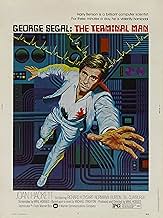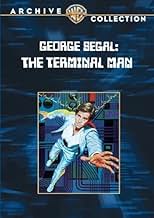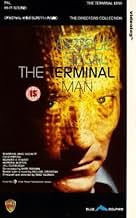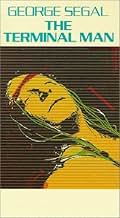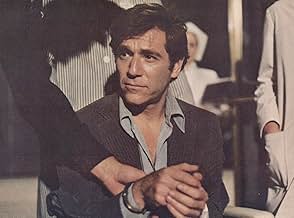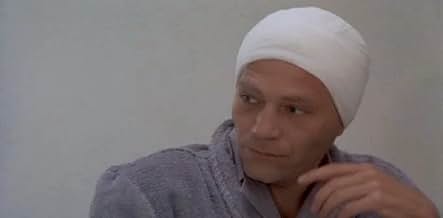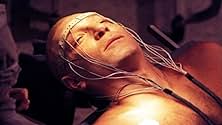Con la esperanza de curar sus ataques de desmayo, que le vuelven temporalmente extremadamente violento, un informático acepta someterse a una operación experimental de implante de un chip in... Leer todoCon la esperanza de curar sus ataques de desmayo, que le vuelven temporalmente extremadamente violento, un informático acepta someterse a una operación experimental de implante de un chip informático cerebral.Con la esperanza de curar sus ataques de desmayo, que le vuelven temporalmente extremadamente violento, un informático acepta someterse a una operación experimental de implante de un chip informático cerebral.
- Dirección
- Guionistas
- Elenco
- Dr. John Ellis
- (as Richard A. Dysart)
- Det. Capt. Anders
- (as Normann Burton)
- Dirección
- Guionistas
- Todo el elenco y el equipo
- Producción, taquilla y más en IMDbPro
Opiniones destacadas
The plot centres on a group of scientists and doctors who are pushing the frontiers of neuroscience by implanting a computerized chip in the brain of a man (George Segal) afflicted with terrible seizures. The chip is programmed to shock the patient's brain each time a seizure is about to happen. The effort is prestigious, the technology flawless, and the doctors, scientists and technicians react to the initial success of the project with a certain conceited arrogance. Only when the the chip malfunctions, and the patient breaks out of the hospital and starts killing people, does the veneer of omnipotence and professionalism fall away, revealing in the scientists ambition, uncertainty, and humanity.
Segal does a good job of portraying the wildly changing emotions of a man who's mind is under the control of a computer. At the push of a button he can be made to laugh, cry, scream, babble like a child, or even become aroused, as the computer chip in his brain explores his mental map. It's a study that would be interesting to fans of Oliver Sacks.
The most interesting moments of the movie are the early ones, where the patient interacts with his dispassionate doctors in the sterile, streamlined chromium world of the hospital. The doctors and scientists seem like mechanical, perfected reflections of the technologies that surround them. The messy humanity of the patient, demonstrated through humour, fear, weakness and anger, stands in contrast to his surroundings, and it is not surprising to the audience when he disappears from his hospital room.
Scenes of the doctors in tuxedos and evening gowns at a dinner party while a shiny computer console monitors their ailing patient lend the robotic professionals a strange, formal humanity, at the same moment in the movie when their own fallibility begins to be revealed. Both technology and technologists promise perfection, and in the end both are revealed as imperfect and unable to overcome the challenges of the human condition - sickness, insanity, violence and death.
Once the patient leaves the hospital, the movie shifts to a more conventional 'crazed murderer' theme, and things become less interesting. It is this shift that cripples Terminal Man and prevents it from being the science fiction classic it might have been. The movie closes with a disappointing, clichéd 'Big Brother' riff on mind control and the future.
This is still a movie worth watching, however, if only to get a glimpse of how the 1970s saw the near future. There are endless details for the technophile, from absurdly technological architecture to atomic batteries to ancient video terminals to mainframe computers to futuristic touchtone telephones. The technological landscape is presented with a glistening newness that evokes movies like The Anderson Tapes, Coma, Westworld, and The Andromeda Strain (the last three of which, like Terminal Man, were written by Michael Crichton). The set design and the soundtrack (mostly Bach, No. 25 in the Goldberg Variations) create an inviting, peaceful sense of space that stands at odds with the tension of the plot. The clean, elegant world of Terminal Man is one in which you would want to live.
Watch Terminal Man for the sets, for the music, and for its nostalgic sense of a forgotten future. Back in the 70s, this was the future everyone was expecting, if not hoping to find right around the corner. Like Andromeda Strain, Coma and the Anderson Tapes, Terminal Man is less a thriller and more a cultural time capsule. Get comfortable in your beanbag chair, turn on the lava lamp, and enjoy.
This is a Michael Crichton book. The prolific writer has some big ideas but it often takes a good adaptation to inject a compelling narrative. This movie doesn't have it. The story is drawn-out and slow-moving. The surgery takes forever and generates little tension. The second half tries to turn into something else. By then, most people would have already lost interest. This movie may work better if it skips a lot of the surgery minutia. The story may have some social commentary to make but it's just too darn slow.
George Segal is believable as Harry, and the rest of the cast is fine, and though Mike Hodges tries, this film is simply too dreary and downbeat to succeed, and by the end, there doesn't seem to have been any discernible point to it all.
"The Terminal Man" is everything but a bad film, although it's fairly easy to see why many people dislike it. The brief plot description promises an exciting concept of a man suffering from psychosis who agrees to participate in a scientific/medical experiment in which a tiny computer is implanted in his brain that will keep his violent impulses under control. Although seemingly successful at first, the man's brain somehow becomes addicted to the little shocks that the electrodes are sending out, resulting in the triggering of even more violent impulses. If you read it like this, "The Terminal Man" sounds like a tense, exciting and action-packed thriller, but instead it's actually a slow-brooding, atmospheric and integer drama. It all is a bit misleading perhaps The premise speaks of "A man suffering from a mental condition that often causes him to become homicidal", but we are only introduced to Harry Benson when he obediently awaits the operation and remains very calm and docile at all times. There are only a few photographs to indicate his violent nature. Then the operation itself is almost shown integrally, which raises the impression to last forever. Then, finally, the plot describes how Benson – and I quote – "escapes from the hospital and goes on a spree of violence and murder". Well, first of all, there's a long period of time between the operation and the escape in which barely anything happens. The so-called spree of violence and murder is somewhat exaggerated as well, since Benson only commits one murder (although admittedly a very savage one). However, to compensate for the lack of action, we do receive – next to the intelligent and tense script – a continuous series of extraordinary beautiful camera angles, compositions and set-pieces. Director Mike Hodges ("Get Carter", "Pulp") literally turns the film into a work of art, with stunning cinematography and exquisite use of classical music. I honestly wished for "The Terminal Man" to benefice from a faster pacing, a bit more background to Harry Benson's character, a bit less medical mambo-jumbo and a few more brutish murders.
Today's audiences however, with their short attention spans, will likely be permanently disappointed. To those who complain that this film is "slow" (and they are legion); I would say to either learn some patience, or simply avoid the film and go back to watching action/adventure.
While made in the early 1970's, it is highly relevant to today's world as well. Replace the "wires in the brain" with today's over-prescribed Ritalin, SSRI's, and other similar drugs, and you will see the point.
This is an excellent movie which deserves to be on DVD, with commentary by Crichton, Hodges and/or Segal. They are all still with us as of 4/2008 (Sadly Ms. Hackett is not). The sooner the better.
¿Sabías que…?
- TriviaCrichton was fired from writing the screenplay due to the fact that his script did not follow the novel (which he had written) closely enough.
- ErroresAt the cemetery, the usual mechanism for lowering the coffin into the grave is missing. There aren't even any straps in place to lower it manually.
- Citas
Benson: [mumbles]
Dr. John Ellis: [operating on Benson] What was that?
Dr. Robert Morris: Patient.
Dr. John Ellis: You all right, Mr. Benson?
Benson: [groggily] Fine... fine...
Dr. John Ellis: Any pain?
Benson: No...
Dr. John Ellis: Good. Just relax now.
Benson: You too doctor...
- Versiones alternativasOn its release at 2003 Edinburgh Film Festival, there was a director's cut which Hodges had cut out the beginning with the doctor looking at photographs of Harry Benson.
- ConexionesFeatured in Cinemacabre TV Trailers (1993)
- Bandas sonorasGoldberg Variation No. 25
by Johann Sebastian Bach (as J.S. Bach)
Played by Glenn Gould
Courtesy Columbia Records
Selecciones populares
- How long is The Terminal Man?Con tecnología de Alexa
Detalles
- Fecha de lanzamiento
- País de origen
- Idioma
- También se conoce como
- The Terminal Man
- Locaciones de filmación
- Productora
- Ver más créditos de la compañía en IMDbPro
Taquilla
- Total en EE. UU. y Canadá
- USD 224,542
- Tiempo de ejecución1 hora 44 minutos
- Mezcla de sonido
- Relación de aspecto
- 1.85 : 1
Contribuir a esta página



